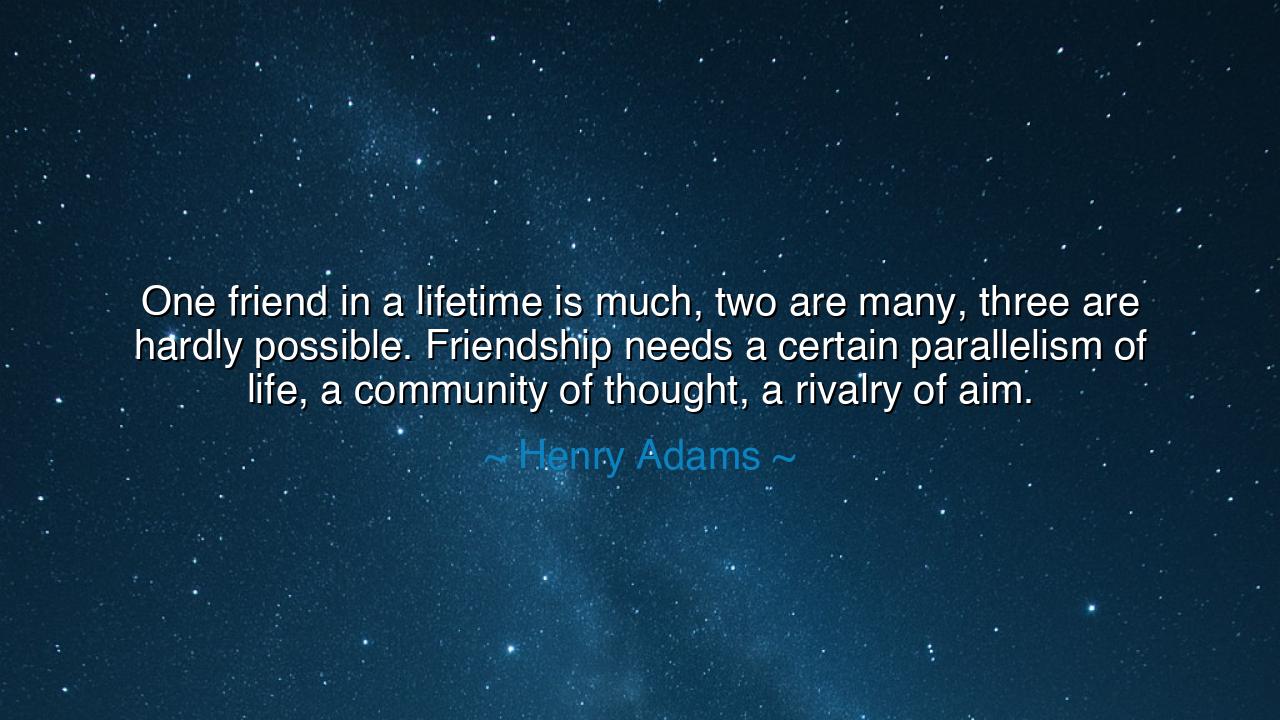
One friend in a lifetime is much, two are many, three are hardly
One friend in a lifetime is much, two are many, three are hardly possible. Friendship needs a certain parallelism of life, a community of thought, a rivalry of aim.






“One friend in a lifetime is much, two are many, three are hardly possible. Friendship needs a certain parallelism of life, a community of thought, a rivalry of aim.” Thus wrote Henry Adams, the philosopher-historian of America’s Gilded Age, whose reflections reached beyond politics and intellect into the quiet depths of the human soul. In this saying, Adams unveils the sacred rarity of true friendship—not the casual camaraderie of convenience, but the profound communion of two souls who walk side by side upon the same path of life. His words speak to the heart’s yearning for understanding and to the reality that such deep harmony is seldom found among many. For true friendship, as Adams declares, is not abundance, but alignment; not multitude, but mastery of connection.
The origin of these words lies in Adams’s lifelong observation of human character and ambition. Descended from two presidents, born into privilege, and surrounded by the great minds of his age, he was a man who moved among many—but was truly close to few. In his autobiography, The Education of Henry Adams, he often lamented the isolation that accompanies intellect and achievement. He had known countless acquaintances, allies, and companions, yet few who shared that “parallelism of life,” that shared rhythm of thought and purpose that makes two lives move as one. For Adams, friendship was not built upon affection alone, but upon the convergence of minds and the harmony of souls striving toward similar ideals.
“One friend in a lifetime is much,” he says, for such a bond is rare beyond price. Most people we meet touch only the surface of our lives, their courses diverging too soon, their interests too fleeting. But the true friend—one who mirrors our moral compass, challenges our thoughts, and shares in both our victories and our doubts—is a treasure almost divine. “Two are many,” for to find even one soul so closely aligned is to be blessed beyond expectation. And “three are hardly possible,” for harmony of this depth cannot be multiplied without losing its essence. True friendship, like the finest flame, burns brightest between two—it cannot easily be divided among many without dimming its light.
Yet Adams does not describe friendship as a passive comfort. He speaks of a “rivalry of aim,” a phrase of great insight. In true friendship, there must be both harmony and tension, unity and challenge. The finest friendships are not those where one flatters or imitates the other, but where both grow through mutual striving—each pushing the other toward greater heights. Just as iron sharpens iron, so do noble friends strengthen one another. This “rivalry” is not born of envy but of inspiration. When two share a common goal, their spirits ignite each other, their excellence multiplies. Such friendship is not a resting place, but a forge—where both are tempered into their better selves.
History, too, bears witness to this truth. Consider Socrates and Plato, the philosopher and his student, bound by a friendship that changed the course of human thought. Their lives shared a community of thought and a rivalry of aim—Socrates devoted to the pursuit of virtue through questioning, and Plato, through his dialogues, seeking to immortalize that pursuit in words. Their bond was not one of comfort but of creation; it was born of inquiry, of shared wonder at the mystery of truth. When Socrates was condemned to die, Plato’s grief did not destroy him—it inspired him to carry the flame forward, ensuring his teacher’s wisdom lived for all ages. Such is the mark of true friendship: it survives death, distance, and time, because it is rooted not in circumstance, but in the eternal alignment of purpose.
Adams’s words also warn against mistaking multitude for meaning. In an age that prizes connection above understanding, we are tempted to count friends as one might count coins. But what worth are numbers if they lack depth? The wise man seeks not many companions, but one or two whose souls move with his own—who share his principles, his passions, his moral horizon. For a single true friend is worth more than a thousand admirers. Friendship, to endure, demands patience, honesty, and shared striving. It cannot be sustained by flattery or convenience, but only by the parallelism of life—that mysterious alignment where two separate paths merge into one.
Let this be the lesson that Henry Adams leaves to the generations: do not seek many companions, but seek those few whose spirits echo your own. Cultivate friendships rooted in virtue, not vanity; in truth, not advantage. Cherish the friend who challenges you, who mirrors your best self, and who stands beside you not only in triumph but in trial. Such friendships are not found—they are forged. They grow through honesty, sacrifice, and shared purpose. And when you find one such soul in the course of your life, honor them as you would honor fate itself—for you have met not merely a friend, but a reflection of your own highest being.
For as Adams teaches us, friendship is not a crowd, but a covenant. It is the joining of destinies, the merging of dreams, the silent understanding between two hearts that walk the same road. To have one such companion in a lifetime is to have known the rarest gift of all—that of being truly understood, and through that understanding, becoming greater than you were alone.






AAdministratorAdministrator
Welcome, honored guests. Please leave a comment, we will respond soon